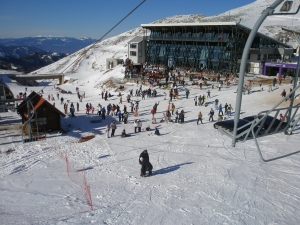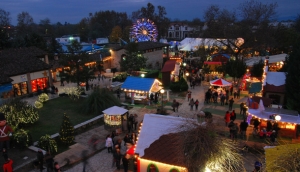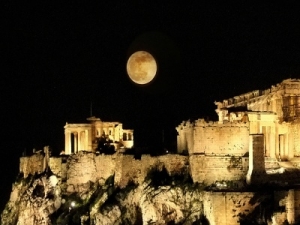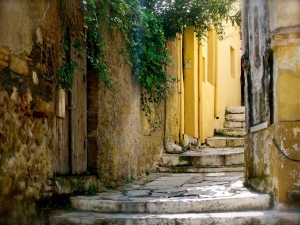LIFE & CULTURE
XpatAthens
Tuesday, 29 December 2015 07:00
Parnassos Ski Center
The Parnassos Ski Center, Greece’s largest located in Central Greece, is up and running and ready to welcome snow and ski lovers to its slopes.
The popular ski resort officially launched for operation on Christmas Eve, with its Aeolus and Pericles trails ready for action and its Venus, Baccus, Aeolus and Dias lifts in place.
Ski and snowboard lovers will have the chance to enjoy their favorite sport as the first snowfall officially marks the beginning of the season.
To read more, please visit: Greek Travel Pages
Published in
Travel Greece
Tagged under
Wednesday, 30 December 2015 07:00
The Mill Of Elves In Trikala
The city of Trikala in Central Greece has become known as a winter destination because of an innovative idea to turn an old mill into the largest Christmas theme park in Greece. Four years after its inception the project has evolved from a small Christmas fair to a large theme park that last year welcomed more than 850.000 visitors.
“It wasn’t easy in the beginning to convince the city’s council to spend a million euros to make a seasonal theme park that operates only for 38 days per year and then it is deconstructed, while visitors pay nothing to enter” said Odysseas Raptis, the CEO of eTrikala S.A. who runs the project. “Our goal wasn’t to make money from the project itself, but to find a way to stimulate the local economy.”
Within four years, they are almost breaking even, while the “The Mills of Elves” brings in about 15 million euros to local businesses and the surrounding villages.
“Greece didn’t have a big Christmas theme park and we thought that this would be an excellent idea for people to come to our city,” added Raptis.
Published in
Greece In The News
Tagged under
Monday, 28 December 2015 07:00
Bring A Child To Work
Over the past years, the South African Embassy has pursued educational and cultural projects as they are of vital importance in promoting South Africa's culture and diversity abroad.
In this respect, The Embasy initiated a school project called 'bring a child to work.' The project serves as a career guide, providing motivation for students to better identify themselves with careers in the public sector or related fields.
Othisis School had the opportunity to visit the South African Embassy premises and learn more about how an Embassy functions on a daily basis. The Head of Mission and Embassy's diplomats welcomed the students, provided a brief background about South Africa and answered questions asked by students. By the end of the visit, students had a clear picture of South Africa and its presence in the Hellenic Republic.
Published in
Local News
Tagged under
Saturday, 01 October 2016 18:06
Ice Skating In Athens
A recent leisure activity to enjoy during winter in Greece is ice skating! Ice skating is great for all ages and can be found at various spots around the city. Here we provide you with information on where to find ice rinks - either permanent or mobile - in Athens.
If you know of an ice rink and it's not below,
let us know by email at ideas@xpatathens.com.
let us know by email at ideas@xpatathens.com.
Ice Rink in the Heart of Athens
The largest, permanent ice rink in Greece is ready to welcome everyone this winter. Operating from 19th September 2015 to the end of April 2016, the ice rink is over 1,000 square meters. Located next to the Athens Heart Shopping Mall, the rink is covered by a specially designed tent, making it possible to skate in all weather and is perfect for families.
Price: €10 for an unlimited session
Opening hours:
Mon-Fri: 15:00 - 23:00
Weekends: 11:00 - 23:00
Address: Piraeus St 186, Athens,
Ice Arena at Megaron Concert Hall
Ice Arena, for the first time in the history of Megaron, operates at its premises one of the most elegant and unique ice rink in Athens throughout the winter season.
In the special and original area of the "Atrium", the new ice rink of ICE ARENA with a size of 375 square meters, completely covered by a beautiful and original tent so guests can skate in all weather conditions.
The service of our customers begins at the modern and picturesque houses of the ice rink, where our staff will help you rent skates and gives you the first necessary advice. Then you are ready to enjoy the top quality of ice for unlimited time, always accompanied by the specialized staff Ice Arena for your safety.
Price: €10 for an unlimited session
Opening hours:
Mon-Fri: 16:00 to 23:00
Weekends & holidays: 11:00 to 23:00
Address: Athens Concert Hall, Vas. Sofias Ave. & Kokkali St., 115 21 Athens
Ice Arena at Village Shopping
In the open space of "VILLAGE shopping and more…," next to the cafeterias, the restaurants and all the playgrounds, a new ice rink of 400 m² is created, which is fully covered by a beautiful and practical tent for skating under all weather conditions.
"VILLAGE shopping and more..." covers all the needs of its visitors who want to enjoy the huge movie theatre or dozens of shops for a coffee, food, ice cream and all sorts of different entertainment for children and shopping for adults.
Everything under one roof.
Price: €10 for an unlimited session
Opening Hours:
Mon-Fri: 16:00 - 23:00
Weekends: 11:00 - 24:00
Sources: Livin'Lovin' and Ice Arena
Price: €10 for an unlimited session
Opening Hours:
Mon-Fri: 16:00 - 23:00
Weekends: 11:00 - 24:00
Sources: Livin'Lovin' and Ice Arena
If you know of an ice rink and it's not in this list,
let us know by email at ideas@xpatathens.com.
Published in
City Discovery
Tagged under
Tuesday, 22 December 2015 11:20
Christmas Full Moon - First In 40 Years
Not since 1977 has a full moon dawned in the skies on Christmas. This year a bright full moon will be an added gift for the holidays. The last of 2015, December's full moon is called the Full Cold Moon because it occurs during the beginning of winter.
In the future, Christmas will coincide with a full moon every 19 years. This rare event won't happen again until 2034 (then in 2053 and 2072) so be sure to look up to the skies on Christmas Day!
Source: ScienceDaily
Published in
Local News
Tagged under
Tuesday, 22 December 2015 11:04
Reflections Of Life In Greece 2015
With Christmas around the corner and the end of the year in sight, many of us pause from shopping and cooking to look back at 2015. Some of us have reactions like ‘what was that??!’, while some others of us still prefer to count our many blessings… No matter what side of the proverbial fence you sit on – nor if you wobble back and forth like me – we can all reflect on a year that was defined by challenges, struggles, confusion…
This was a year that I often needed reminding of the reasons why I moved to Greece… Surrounded by so much that reminds of the contrary, revisiting those reasons, for me, told me that not so many of them have changed. In fact, all the things that brought me here still apply. So here I remain.
I came across two interesting articles that I want to share – one in English and one in Greek.
The first one is a piece by David Constable in the UK’s Daily Mail. He speaks about Athens as the ultimate open-air university – and reminds us of some of the things we all know and love about this city that – he says - has ‘its greatest years still ahead…’ Check it out HERE.
The second piece is a list of ‘interesting facts’ about Athens and Greece, which are quite familiar – but interesting nonetheless. At the very least, these are useful to pull out for Christmas dinner conversation. The original Greek piece is HERE and below are a few facts translated:
1. On average, around 16.5million tourists visit Greece each year.
2. 7% of the world’s marble comes from Greece.
3. Greece is the world’s 3rd largest producer of olives – with some olive trees dating back to the 13th century!
4. Greece is the world’s largest producer of natural sponges.
5. 80% of the country’s land is mountainous, without a single ‘navigable’ river
6. 12 million people speak Greek around the world.
7. In the 1950’s, literacy was around 30%. Today, it’s around 95%
8. Although there are 2,000 islands in Greece, only 170 of them are populated.
9. The population of Athens in 1834 was 10,000 people.
10. Athens has been continuously inhabited for more than 7,000 years, making it one of the oldest cities in Europe.
11. Greece enjoys 250 sunny days each year – that means more than 3,000 hours of sunlight!
12. In ancient Greece, life expectancy was 36 for women and 45 for men – with more than half of all babies not living past infancy. Today, life expectancy is 77 (men) and 82 (women).
13. 70% of Europe’s merchant marine fleet fly Greek flags. Those ships must have 75% of their crew with Greek nationality.
14. Greece has more archaeological museums than any other country in the world.
15. Around 100,000 birds from northern Europe and Asia spend winters in Greece.
16. Slaves in ancient Greece made up 40-80% of the population of the city-states. These slaves were usually prisoners of war, abandoned children, or children of slaves.
17. Greece has 116 species of mammals, 18 species of amphibians, 59 species of reptiles, 240 species of bird and 107 species of fish. Around half of the mammal species are in danger of extinction.
18. No point in Greece is more than 137 kilometres from the sea. Greece has the 10th longest coastline in the world.
With this, I wish for everyone a happy and healthy 2016, full of sunny days and many smiles!
Until next week,
Jack
Published in
My Week In Athens
Tagged under
Monday, 15 December 2025 07:00
Traditional Homemade Kourabiedes
Merry Christmas with these amazing festive sweet butter cookies! If you haven’t tried kourabiedes (Greek Christmas butter cookies) before, then you are certainly missing out. Soft, buttery, and fluffy with a crunchy bite and rich almond (or pistachio if you are feeling adventurous). This delicious kourabiedes recipe will definitely get you in a festive mood!
Kourabiedes are a delicious traditional Greek treat, packed with the aromas of fresh butter and roasted almonds and garnished with luscious layers of icing sugar - they are the ultimate Christmas cookie!
Prep Time: 40 minutes
Serves: 45-50 Cookies
Serves: 45-50 Cookies
Ingredients
- 500 g butter, at room temperature
- 220 g icing sugar
- 1 g vanilla powder
- 1 teaspoon(s) rosewater
- 30 g bitter almond liqueur, or brandy or rum
- 200-280 g almond slivers or coarsely chopped, unsalted and toasted
- 900 g all-purpose flour
- 1 pinch salt
- 1 tablespoon(s) rosewater
- 300 g icing sugar
1. Preheat the oven to 180ο C (350ο F) set to fan.
2. In a mixer’s bowl add the butter, the icing sugar, and beat with the paddle attachment at high speed, for 10-15 minutes, until the mixture is fluffy and white.
3. Add the vanilla powder, the rosewater, the bitter almond liqueur, and keep beating. Remove the bowl from the mixer.
4. Break down the almond slivers with your hands, in order to crumble them, and add them to a bowl. Add the flour, the salt, and put them in the mixer’s bowl.
5. Mix the mixture with a serving spoon, very softly so that it does not lose its volume. As soon as the ingredients are homogenized, mix with your hands.
6. Shape balls, 30 g each, and transfer to a baking pan lined with parchment paper. Lightly press the center with your finger and bake for 20-25 minutes.
Published in
Greek Food & Diet
Tagged under
Wednesday, 13 January 2016 07:00
Hellenic Seaways Interested In Connecting Greek Islands, Thessaloniki To Izmir
Greek coastal ferry operator Hellenic Seaways recently expressed its interest to operate new routes from Izmir to the Greek islands and Thessaloniki.
The announcement followed an event organized in Izmir by the North Aegean Region and the Izmir Chamber of Commerce and attended by local authorities, Hellenic Seaways, tourism professionals and journalists.
During the event, representatives of Hellenic Seaways presented a complete transportation network that would cover the needs of both countries.
To read more, please visit: Greek Travel Pages
Published in
Local News
Tagged under
Tuesday, 05 January 2016 07:00
Traditional Greek Galaktoboureko Recipe
Galaktoboureko is a traditional Greek dessert made with layers of golden brown crispy phyllo, sprinkled with melted butter, filled with the most creamy custard and bathed in scented syrup.. Simply amazing! This is a very easy to follow Galaktoboureko recipe for you to recreate this traditional sweet delight from scratch. After a lot of experimenting, My Greek Dish has distilled the essence of this delightful traditional Greek dish to a few easy to follow steps for you to make the very best Galaktoboureko on your first effort!
This easy to follow recipe can be summarised in three key stages:
1) Layering the phyllo sheets
2) Preparing the creamy custard filling
and
3) Preparing the scented syrup
The key for thee most flavourable Galaktoboureko is to use a good quality fresh butter to butter the phyllos sheets. The authentic Greek Galaktoboureko recipe calls for 'galaktos' butter - made from a mix of sheep's and cow's milk, but if you can't handle very strong flavour, then you can substitute with good quality fresh butter from cow's milk. When preparing phyllo based desserts, a little trick to make the phyllo crispier and flakier is to sprinkle the melted butter over the phyllo sheets, rather than brushing them. Working with phyllo can be trickey as it's brittle and can dry out very quickly, so check the handling tips before preparing.
Preparing the Galaktoboureko custard:
For the custard, all traditional Greek Galaktoboureko recipes use thin semilina, to achieve the characteristic grainy texture of the crea, which in this case is not considered a flaw. On the contrary, what is considered a flaw of this recipe is a very smooth, starchy and tight custard. In most recipes, the eggs are added whole towards the end, but with Galaktoboureko, the eggs are beaten into meringues and combined in the semolina based cream. This is the secret to a more fluffy and creamy custard and to avoid the egg-y semall, which can ruin the flavour of this dessert. Just be sure to add the semolina slowy to the warm milk to avoid it forming lumps!
To read more, please visit: My Greek Dish
Published in
Greek Food & Diet
Tagged under
Monday, 21 December 2015 07:00
Greek Educator Nominated For Best Teacher In The World
Greek teacher Angeliki Pappa was included in the list of 50 nominees for the Varkey Foundation’s Global Teacher Award 2016. The Teacher Prize Academy nominated Pappa for her work on dyslexia. The prize of one million US dollars will be awarded for the second time, and it is widely known as the Nobel Prize of teaching.
The aim of the Global Teacher Award is to recognize the exceptional contribution of a teacher to the profession, and to highlight the important role of teachers in society.
The top 50 candidates were selected from 8,000 entries and applications submitted from 148 countries around the world. The winner will be announced at the Global Education & Skills Forum, to be held in March 2016 in Dubai.
Angeliki Pappa specializes in teaching English as a foreign language to students with dyslexia and other learning disabilities. The Greek Teacher has always been aware that there were no resources, or special methods available to support students with dyslexia who wanted to learn English in Greece.
To read more, please visit: Greek Reporter
by
Ioanna Zikakou
Published in
Greece In The News
Tagged under













